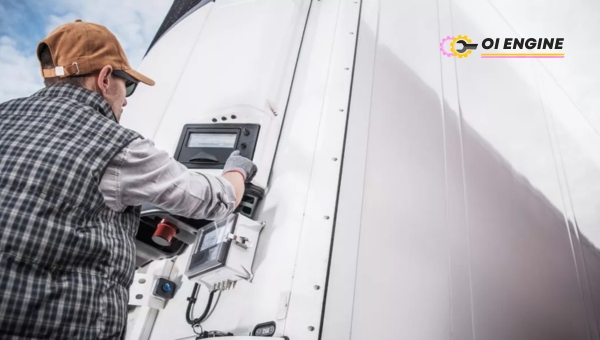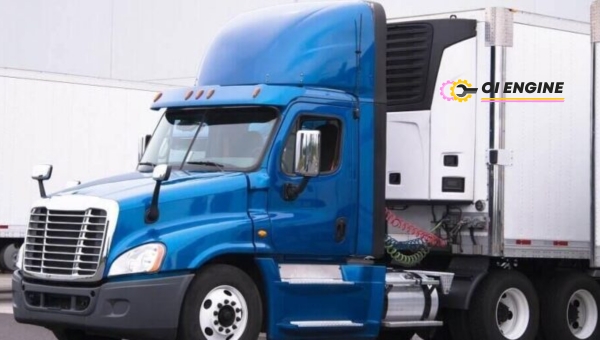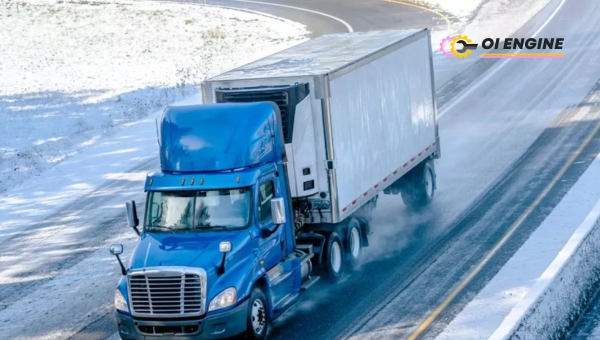Imagine you’re cruising down the highway with a truck full of fresh produce, feeling good about making your delivery on time.
But then, out of nowhere, your reefer unit stops cooling. Panic sets in as you realize all that fresh food could spoil.
That’s where Reefer Breakdown Coverage steps in – it’s like a safety net for those unexpected moments that threaten your cargo and your business.
When a refrigerated truck (often called a reefer) breaks down, it can spell disaster. Not only could you lose precious cargo to spoilage, but the repair costs can also hit hard.
With Reefer Breakdown Coverage, however, businesses protect themselves against such losses. This insurance takes care of repair expenses and reimburses for spoiled goods caused by equipment failure – taking a load off the carrier’s mind.
Also Useful: 10 Legal Services For Truckers
What is Reefer Breakdown Coverage?
Reefer Breakdown Coverage is a type of insurance policy specifically designed to protect companies operating reefer trucks from financial setbacks due to equipment malfunctions.

The losses incurred from unforeseen breakdowns can be crippling for businesses – from perishable goods getting spoiled to expensive repairs for damaged equipment. With this coverage in place, I don’t need to lose sleep over such potential problems.
This specialized insurance caters specifically to the unique needs of carriers who transport temperature-sensitive goods.
It doesn’t matter if I’m managing a fleet of hundreds or operating just one reefer truck – securing effective Reefer Breakdown Coverage is an essential aspect of business continuity planning.
When my business involves keeping temperature-sensitive cargo under controlled conditions, ensuring robust protection for my refrigerated trucks becomes more than just an afterthought.
How Does Reefer Breakdown Cover Work?
Understanding how these policies work can help me make informed decisions when choosing coverages and filing claims:
- Policy Initiation: To initiate a Reefer Breakdown Coverage policy, I first need to apply through an insurer that offers these specific plans. As part of this process, they may evaluate factors such as the state and maintenance history of my reefer units and the nature and volume of goods I typically transport.
- Deciding Premiums: Once accepted by the insurer, they decide on a premium amount based on their risk assessment (higher risks usually mean higher premiums) and provide me with the terms & conditions outlined in my policy document.
- Claim Filing: If any breakdown or malfunction occurs affecting my reefer units, a claim can be filed with the insurance company. It is crucial to report such incidents promptly, providing detailed information about what happened, backed by repair receipts, shipment documents, and other relevant evidence as required by the insurer.
- Claim Processing: The insurer then assesses my claim, verifying the incident’s authenticity and determining if it falls within the coverage scope. If approved, they pay out a sum (as specified in my policy) to cover losses incurred due to the breakdown.
Getting familiar with this process allows me to navigate it more effectively when needed – much like understanding the road helps steer clearer on any journey.
Importance of Having Reefer Breakdown Coverage
Securing a backup plan for your refrigerated truck business is crucial. That’s where reefer breakdown coverage comes in.

This insurance protects you from the costly repercussions of unexpected equipment failure. If you own or operate a refrigerated transport business, I can’t stress enough how essential this coverage is.
Protection Against Large Financial Losses
Operating without reefer breakdown coverage could lead to significant financial losses that can hit any time.
When a refrigeration unit breaks down, not only are you looking at costs to repair or replace it, but you’re also staring down the potential loss of perishable cargo.
This means lost revenue and customer complaints – often ending up in damaging lawsuits. Reefer breakdown coverage comes to your rescue here, offering financial security and peace of mind.
Reduces Business Uncertainty
In this industry, we know things don’t always go as planned. Anything from a traffic jam to power loss can delay your cargo delivery, spoil products, or even halt operations entirely.
The uncertainty of when something might go wrong leads to stress and instability for any business owner like myself.
Thankfully with reefer breakdown coverage, this risk is dramatically reduced since most policies cover the cost associated with unexpected malfunctions.
Ensures Continuity of Operations
Your primary focus should be delivering goods on time – not worrying about mechanical failures! Without effective coverage like the reefer breakdown policy, if your cooling unit stops working on the road, operations may come to a standstill until it’s fixed or replaced.
This policy prevents unnecessary operational hitches by covering repair costs promptly so that my trucks can get back on the road in no time.
Keeps Customer Satisfaction High
Customer satisfaction is key to maintaining a successful transport service like mine. With perishable products, customers expect deliveries on time and damage-free.
A delayed delivery due to unforeseen breakdowns could lead to unhappy customers and reputational damage.
Good coverage therefore means knowing that even if my truck breaks down, I can still meet customer expectations thanks to the provision of reefer breakdown coverage.
Stay Compliant with Legal Requirements
Complying with legal requirements can help prevent costly fines or the potential shutdown of your business. In many jurisdictions, reefer operators like me need appropriate insurance – including reefer breakdown coverage – before we hit the road.
Being compliant not only keeps me out of legal trouble but also reassures clients about your business’ legitimacy while enjoying a stable operation environment.
Having reefer breakdown coverage is like carrying an umbrella in case it rains; providing backup during system failures minimizes financial loss and ensures the continuity of my operations while keeping customers happy and meeting legal requirements.
Risks Associated with Non-coverage
Understanding the risks of not having reefer breakdown coverage is crucial. If you are in the refrigerated transportation business and do not have this insurance, you may be placing your business at severe financial risk.
Not having appropriate coverage can lead to significant financial loss in the event of a reefer malfunction or failure.
Policy Limits and Premiums
Every insurance policy comes with a limit. This limit is essentially the maximum amount an insurer will pay for a claim.
When it comes to reefer breakdown coverage, most shippers and brokers will require a minimum of $100,000 in cargo insurance coverage.
Now, you might think that a higher policy limit is better because it provides more protection. There’s something important you need to consider: higher limits come with correspondingly higher premiums.
The relationship between your policy limit and premium cost is one of balance. In other words, just as increasing your coverage amount leads to increased premiums (that’s the amount you pay for your insurance), selecting lower limits helps save money on those premiums.
When choosing lower limits, always ensure it still covers the maximum value of cargo being transported; full protection remains necessary if something goes wrong.
Common Exclusions
When we talk about exclusions in terms of reefer breakdown coverage – we’re referring to specific situations or items that are not covered by the policy.
It’s imperative that each individual thoroughly reviews what their potential policies cover before signing on any dotted line.
One common exclusion focuses on why cargo spoilage occurred: reefer breakdown insurance typically only covers spoilage incidents resulting from unit failure; it doesn’t cover user error or driver negligence amongst other things like delays or unrelated incidents.
Certain items too can potentially be excluded from basic policies depending on an insurer’s provisions—items like meat, seafood, pharmaceuticals, and tobacco products sometimes fall into this category—so it’s paramount to confirm with your insurance provider that the policy covers all types of cargo your company typically handles.
Insurance companies can also, unfortunately, try certain tactics to avoid paying out claims—placing restrictive conditions like needing proof that the spoilage resulted specifically from system failure or not insuring specific parts of the refrigerated system such as sensors. Hence why careful consideration and thorough review of potential policies is an absolute must.
Also Related: Amazon Relay Guide: Your Key To Easy Loads
What is the cost of Acquiring Reefer Breakdown Coverage?
When we think about acquiring Reefer Breakdown Coverage, cost is certainly a key point that comes to mind.

Typically, this type of coverage is part of a wider cargo insurance policy. Let’s imagine you have a reefer truck and the limit for your policy is say, around $100,000.
In such circumstances, you would likely see cargo insurance premiums ranging from approximately $1,000 to $2,000 each year. Upfront costs are something to consider when exploring the idea of securing Reefer Breakdown Coverage for your refrigerated freight business.
What Insurance Coverage is Required for Reefer Breakdown Coverage?
As a business owner in the transportation industry, it’s crucial to know what insurance coverage is required for reefer breakdown. Here’s a simple breakdown:

- Damage or loss due to refrigeration unit failure: This point is paramount as the key role of reefer trucks is to keep goods at specific temperatures. Any mishap with the cooling system could lead to massive losses.
- Liability coverage: It’s necessary because if your truck causes damage to other property or individuals, you’re held responsible. Adequate liability insurance helps cover these costs.
- Physical damage coverage: In case the refrigerated truck gets damaged in an accident, this form of insurance helps repair costs.
- Motor Carrier Coverage: If you’re operating under someone else’s authority, their policy might not shield you completely. With motor carrier insurance, cover your bases and protect your financial interests.
- Cargo Insurance: This protects against damage or loss of goods in transit due to perils like theft, collision, or natural hazards.
Each aspect of this list plays an important role in forming a robust contingency plan against unforeseen circumstances involving your reefer unit.
Also Check: Top 10 Bobtail Insurance Picks 2025
FAQs
What is a reefer breakdown clause?
A reefer breakdown clause is a provision under refrigerated truck insurance, also known as Reefer Breakdown Coverage. It provides protection to carriers against losses incurred due to mechanical failures or malfunctions of the refrigeration equipment.
What type of freight is a reefer?
A reefer, short for a refrigerator truck, mainly transports perishable goods. Examples include fruits, vegetables, dairy products, meat, and pharmaceuticals – basically any cargo requiring temperature control during transit.
What is reefer capacity?
Reefer capacity refers to the amount of cargo that a refrigerated truck can carry. This will depend on several factors including the size and design of the truck.
What is reefer damage?
Reefer damage refers to any harm sustained by the refrigerator unit or its cargo. Problems can range from mechanical failure leading to inadequate cooling, to physical damage from an accident or rough handling.
What is a reefer load?
A reefer load refers to the goods being transported in a refrigerator truck. These are typically perishable items that need controlled temperatures throughout their journey from source to destination.
Conclusion
In the realm of transport and logistics, having a comprehensive insurance plan is a non-negotiable essential. Reefer Breakdown Coverage is a staple component that any refrigerated carrier must consider.
It cushions against unexpected costs and risks related to technical failures, offering financial peace of mind. While choosing the right coverage plan, remember to prioritize your business specifics over generic offerings.
Taking account of factors such as premium costs, scope of coverage, and claim processing times can make a major difference in crisis management.
Ensuring timely claims with supporting documents not only fast-tracks your payout but also ensures longevity in your partnership with the insurance provider.
